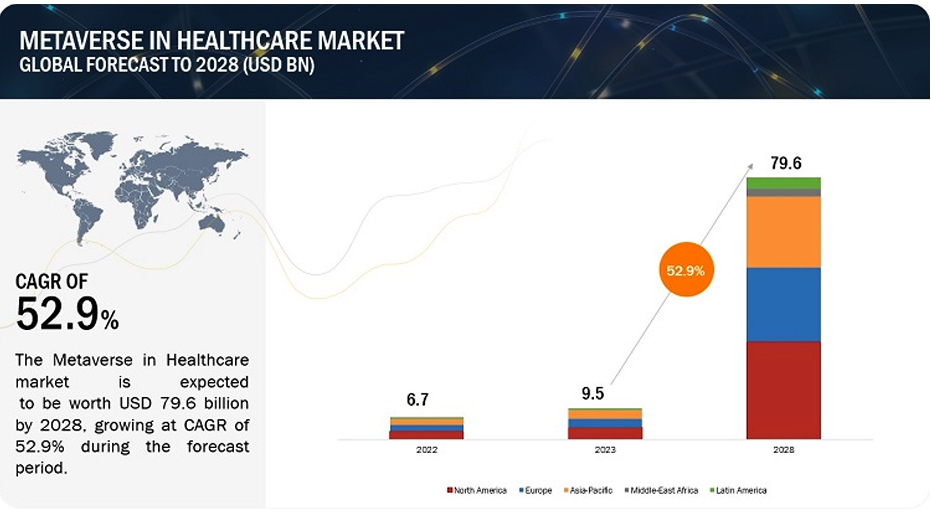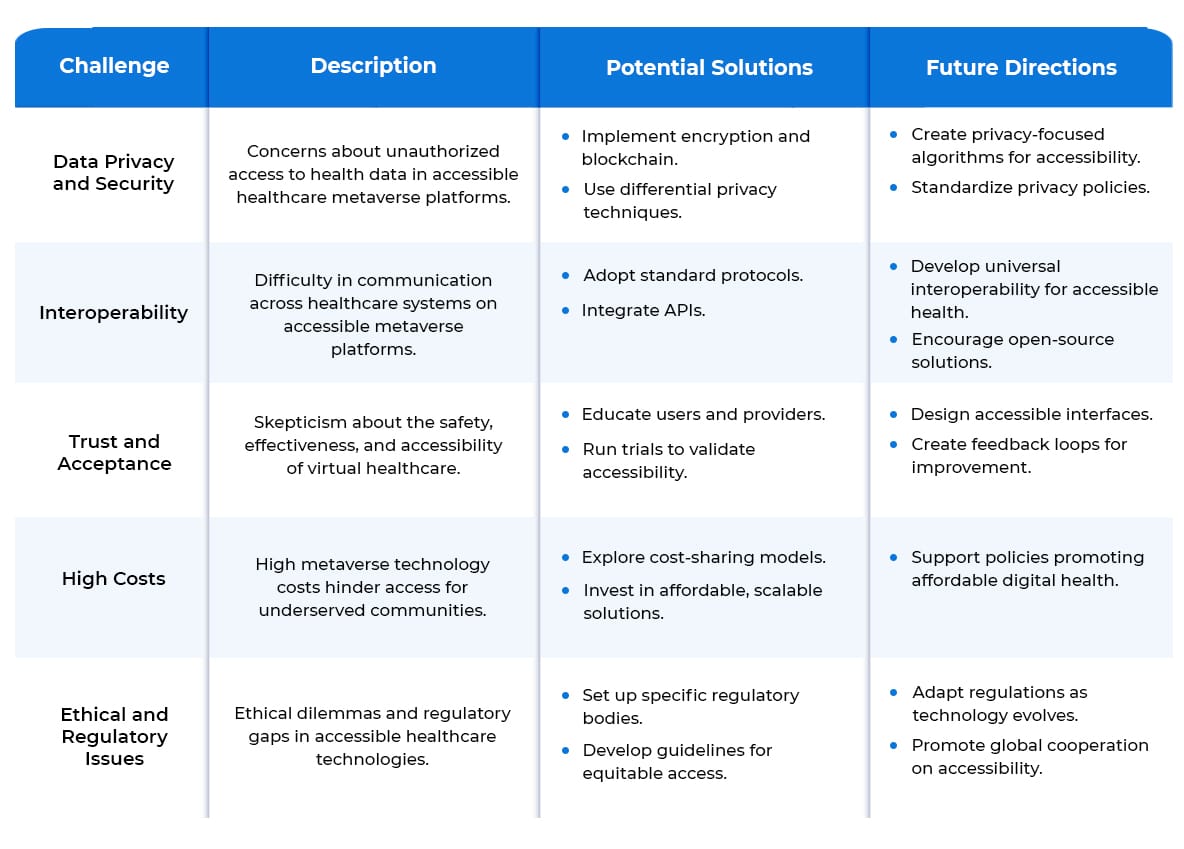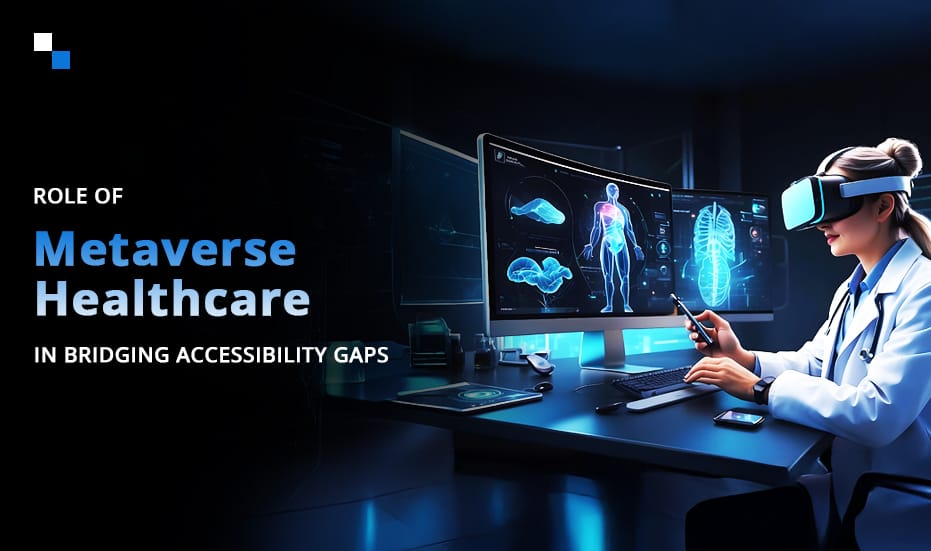What if the healthcare system didn’t require you to travel miles just to see a doctor, and what if top-class treatments and specialists could be at your fingertips—no matter where you live? Metaverse Healthcare is transforming medical into a borderless service, eliminating distance, cost, and time as barriers. This transformative technology brings specialists directly to patients and levels the playing field in global healthcare accessibility.
In this blog, we’ll explore how the Metaverse is transforming healthcare, from virtual consultations to immersive mental health treatments, making top-class care available to anyone, anywhere.
Market Overview & The Current State of Metaverse Healthcare
Metaverse Healthcare has begun reshaping the medical world in ways previously unimagined. Virtual consultations have significantly improved access to care, particularly for patients in remote areas where healthcare resources may be limited. VR and AR technologies are helping to overcome the traditional challenges of medical education by offering highly interactive, risk-free training opportunities for students and professionals. Meanwhile, in mental health care, virtual reality provides innovative treatments, such as exposure therapy and other therapeutic practices, for conditions like PTSD and anxiety.

However, the Metaverse in Healthcare market is on the precipice of a dramatic transformation. Projected to reach a staggering USD 79.6 billion by 2028, the market is poised for explosive growth, fueled by a robust CAGR of 52.9%. This rapid expansion highlights the increasing integration of metaverse technologies across the healthcare landscape, from virtual consultations and surgical simulations to patient education and mental health support. Virtual platforms now enable Metaverse Healthcare to extend its reach to remote communities, providing patients with access to consultations, education, and rehabilitation services, regardless of location.
How Metaverse Healthcare Expands Access for Remote Communities
Access to healthcare has always been a major challenge for people living in remote areas, where medical facilities and specialists are scarce. These individuals often face long travel distances to reach essential care, burdening their time and finances. The integration of the Metaverse Healthcare development services into healthcare presents a revolutionary solution that transcends physical barriers. The Metaverse allows individuals from any part of the world to connect with expert healthcare providers by creating virtual spaces where patients can meet medical professionals without geographical constraints.
Did you know
“Metaverse-Based Medical Training Market Expected to Surpass $90.6 Billion by 2035”
The Metaverse uses VR to create lifelike consultations between patients and healthcare providers through avatars. Patients can receive diagnoses, interact with medical professionals, and even undergo treatments in an immersive virtual setting. This eliminates the need for long-distance travel and connects remote communities with healthcare specialists, improving outcomes and reducing the gap in access to care.
Benefits for Remote Communities:
- No Travel Required: Virtual clinics bring healthcare rights to the patient’s doorstep, eliminating the burden of travel to distant medical centers.
- Access to Specialists: Remote areas gain access to healthcare professionals who may otherwise be unavailable, including specialized care that was previously out of reach.
- Reducing Healthcare Disparities: The Metaverse levels the playing field, offering underserved communities access to the same quality of care as those in urban areas, helping to reduce healthcare inequalities.
The Metaverse Healthcare development services are revolutionizing healthcare by breaking geographical and financial barriers. Virtual environments for consultations and treatments make medical expertise accessible from anywhere. This approach promotes inclusivity, ensuring Metaverse Healthcare is equitable for urban and rural communities. In addition to bridging these gaps, the Metaverse empowers patients through advanced technologies like VR and AR, which provide highly personalized healthcare experiences.
Moreover, real-time interactions with digital avatars of healthcare providers enhance communication and build trust between patients and practitioners. Furthermore, blockchain-based solutions enable secure and transparent patient data management, addressing privacy concerns effectively. With these transformative developments, it becomes essential to understand how Metaverse Healthcare development services make healthcare more accessible by offering virtual consultations, personalized treatments, and secure data sharing for all patients.

How Does the Metaverse Make Patient-Centered Healthcare More Accessible?
Key ways are:
- VR-Driven Mental Health Support: The Metaverse Healthcare development services utilize virtual reality to help patients with PTSD or phobias confront their triggers in safe, controlled environments, providing effective exposure therapy at their own pace.
- Data-Powered Personalization: The Metaverse allows healthcare providers to design tailored treatment plans that meet each patient’s unique needs, ensuring more precise and effective care.
- Building Supportive Healthcare Ecosystems: Metaverse Healthcare enhances communication between patients and healthcare professionals, offering real-time consultations and access to virtual support groups for greater patient involvement and care.
- Remote Diagnosis and Monitoring: Wearable devices integrated with the Metaverse enable remote health tracking and real-time diagnostics, ensuring early detection of potential issues for proactive treatment.
- Inclusive Healthcare Access: Metaverse Healthcare provides underserved and rural populations access to quality care, removing geographic barriers to make healthcare more inclusive and equitable.
The Metaverse enhances patient-centered care while overcoming traditional barriers to healthcare access by providing diverse virtual experiences and facilitating direct, real-time communication.
However, as Metaverse Healthcare grows, it faces challenges related to the privacy and security of sensitive health data, as well as a lack of widespread access to the necessary digital tools in certain regions. Addressing these concerns will be critical to fully unlocking the potential of metaverse healthcare.
Challenges and Open Questions in Accessible Metaverse Healthcare
The integration of accessible healthcare within the Metaverse presents unique challenges and unanswered questions that need careful consideration. Below are the primary challenges, open questions, and future directions surrounding this emerging field:

The Metaverse Healthcare development services hold transformative potential for healthcare, but its accessibility requires addressing these multifaceted challenges. Collaborative efforts among policymakers and healthcare providers are essential to creating an inclusive, secure, and ethical Metaverse Healthcare system.
Final words
Metaverse Healthcare represents a leap into the future of medicine, merging cutting-edge technology with compassionate care. It eliminates physical boundaries, making healthcare more inclusive and equitable for underserved and remote communities. As this market evolves, the fusion of VR, blockchain, and AI promises unprecedented levels of personalization, patient empowerment, and trust-building in healthcare.
However, the journey is not without hurdles. Addressing privacy concerns, ensuring widespread access to digital tools, and navigating ethical dilemmas are key to creating a sustainable ecosystem. Antier, a leader among Metaverse Healthcare development companies, is uniquely positioned to help overcome these hurdles. We leverage our expertise in blockchain for secure patient data, VR-driven consultations, and personalized healthcare ecosystems to deliver innovative solutions tailored to the evolving needs of the healthcare sector. Stakeholders can confidently overcome these challenges and build a healthcare future that is inclusive, transparent, and equitable for all by collaborating with us.







